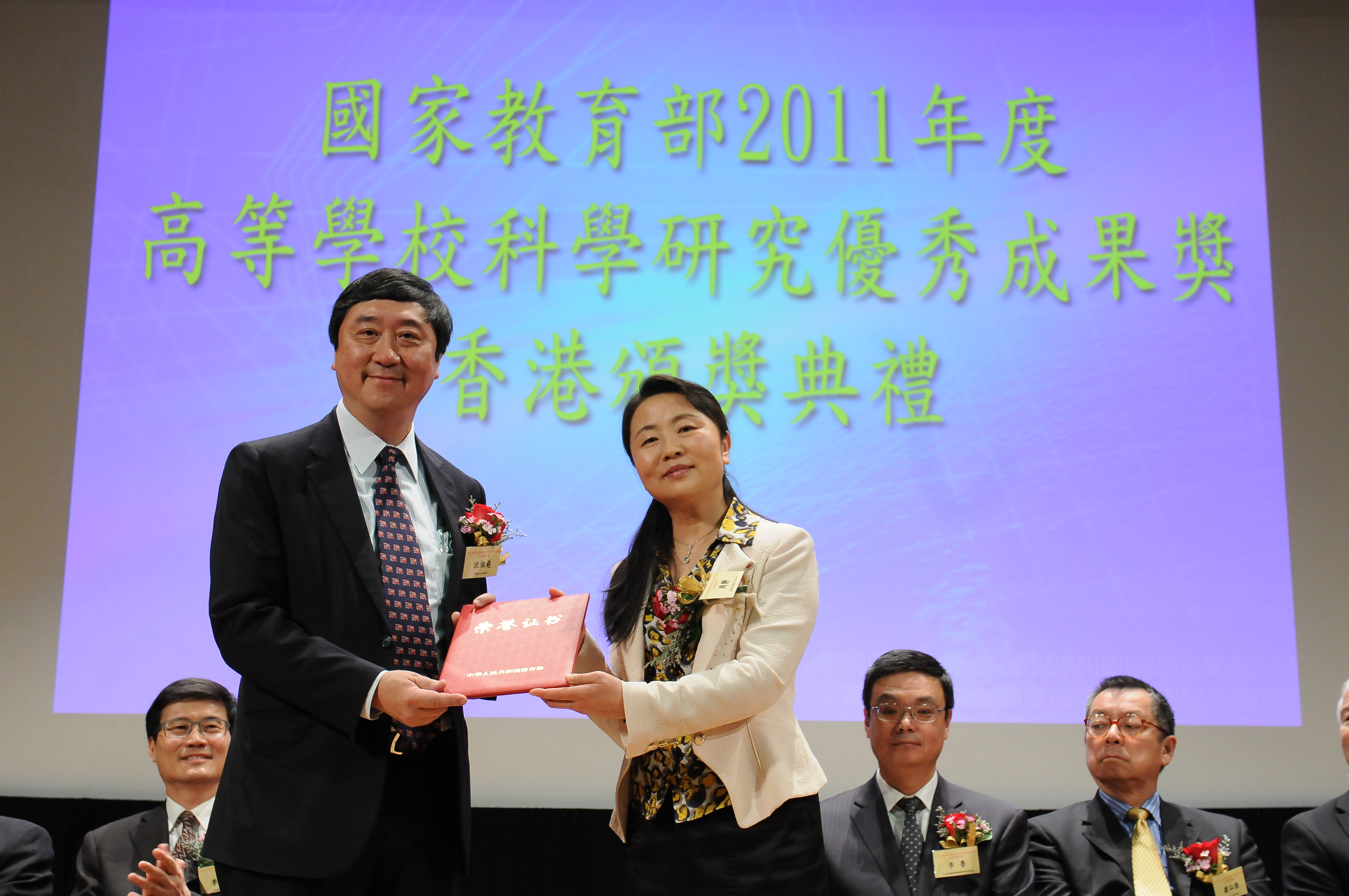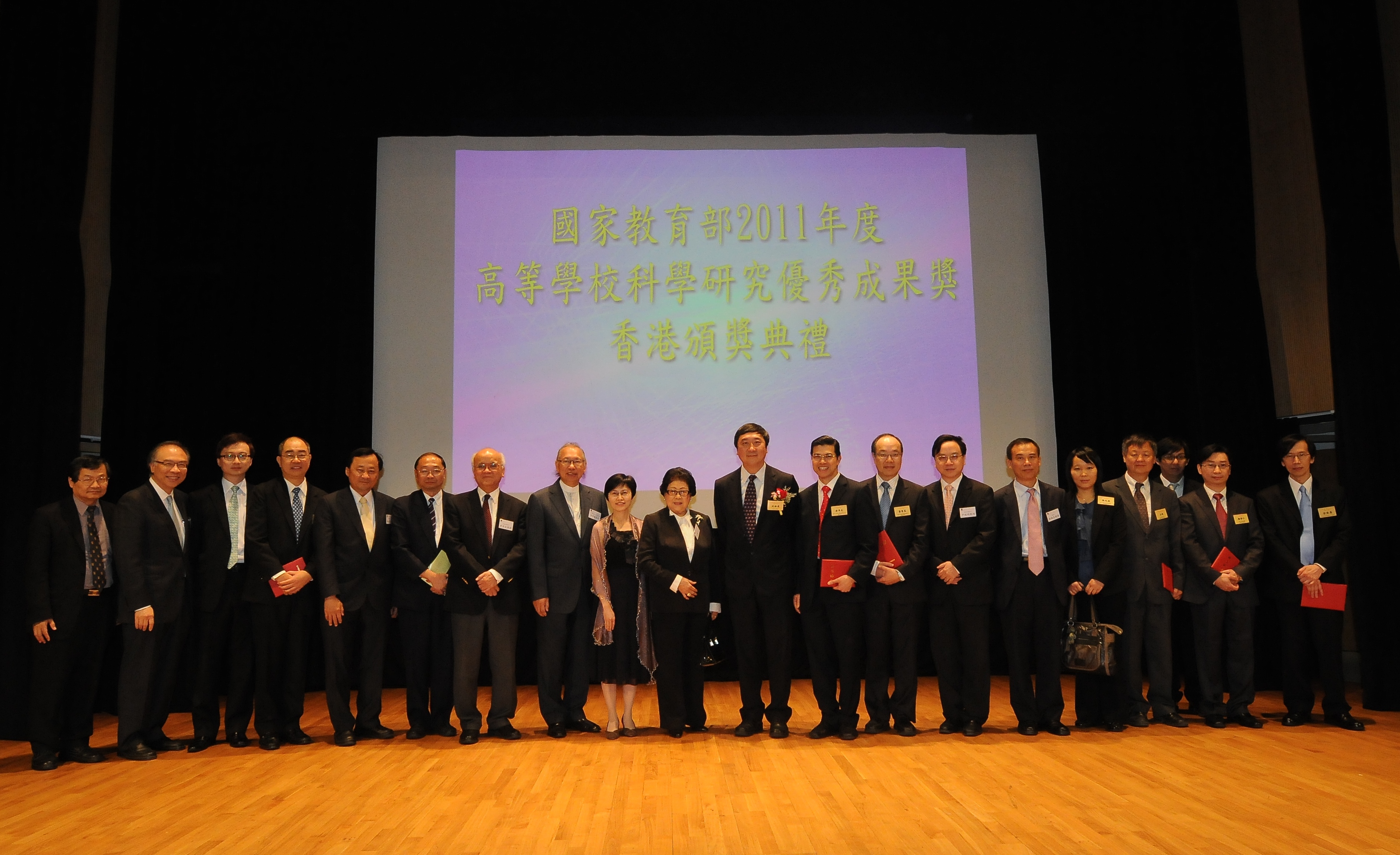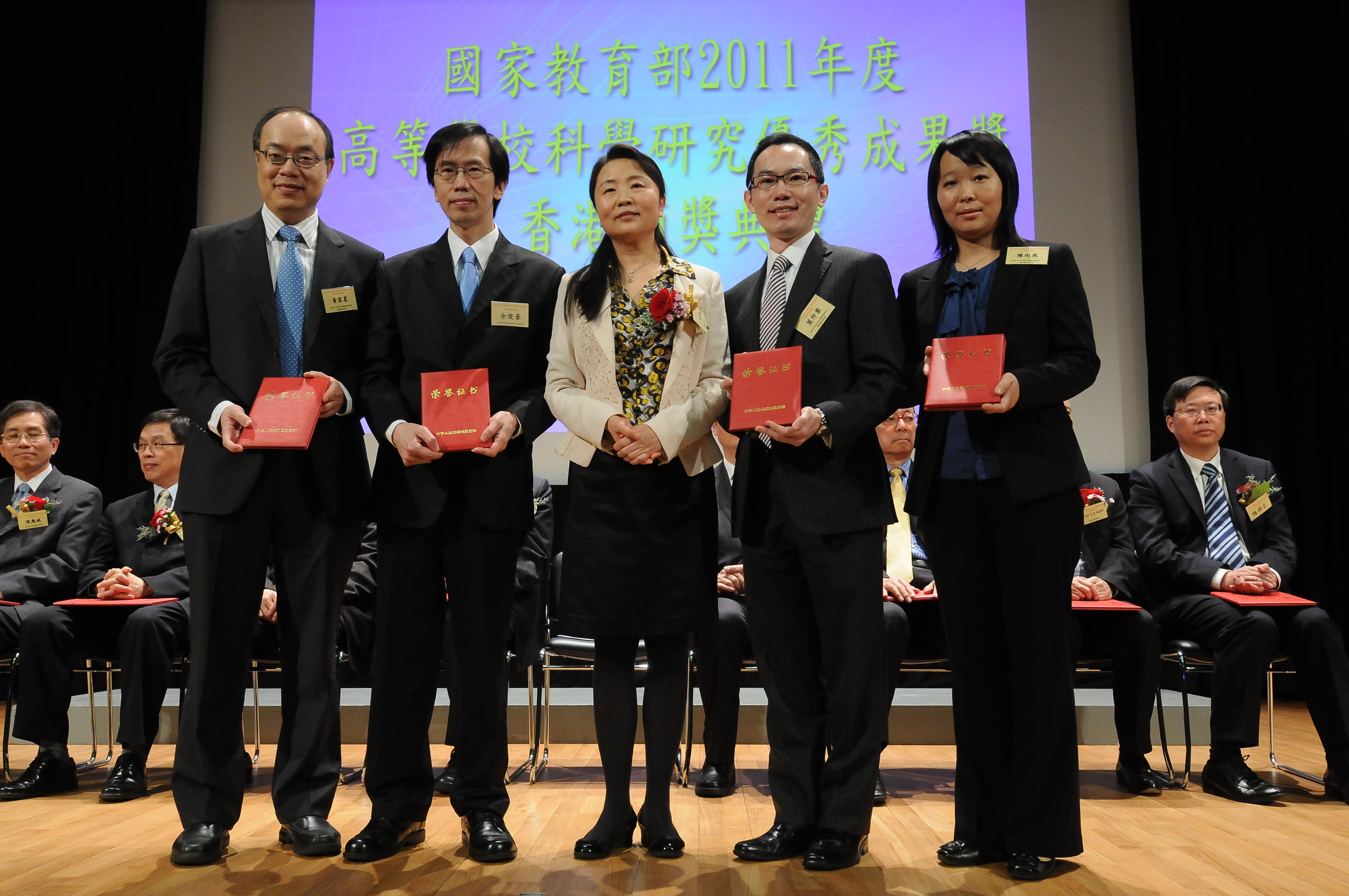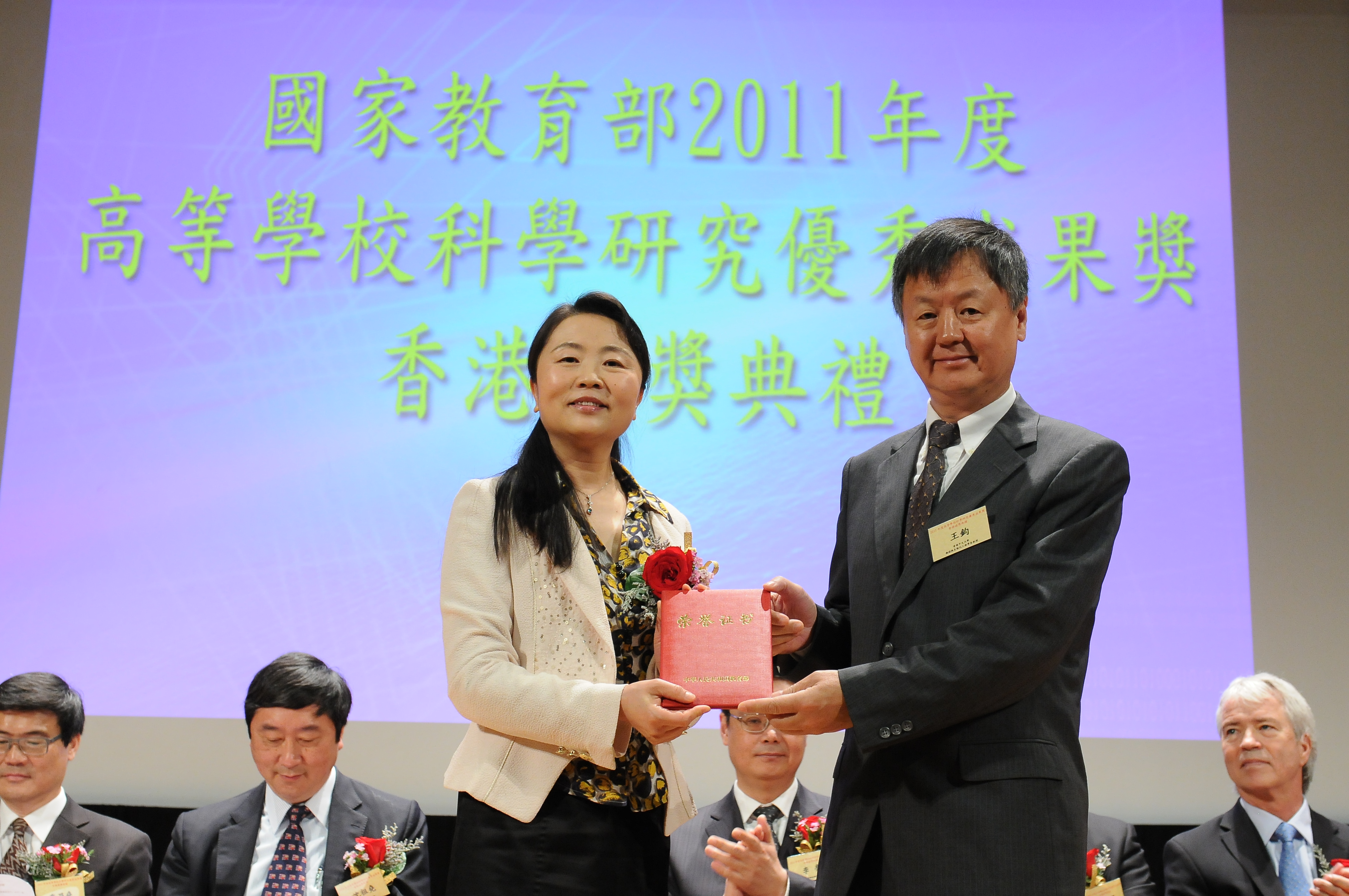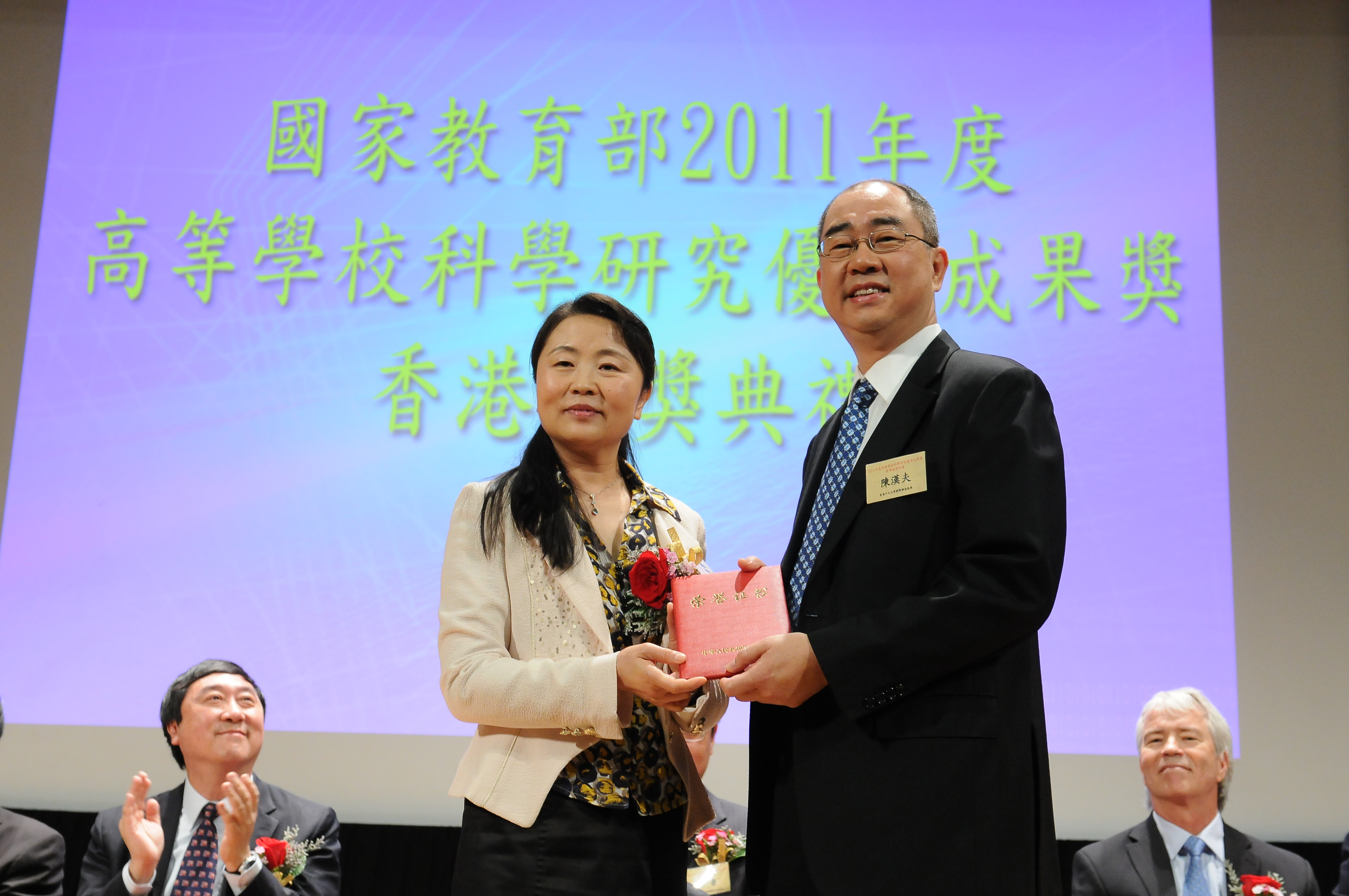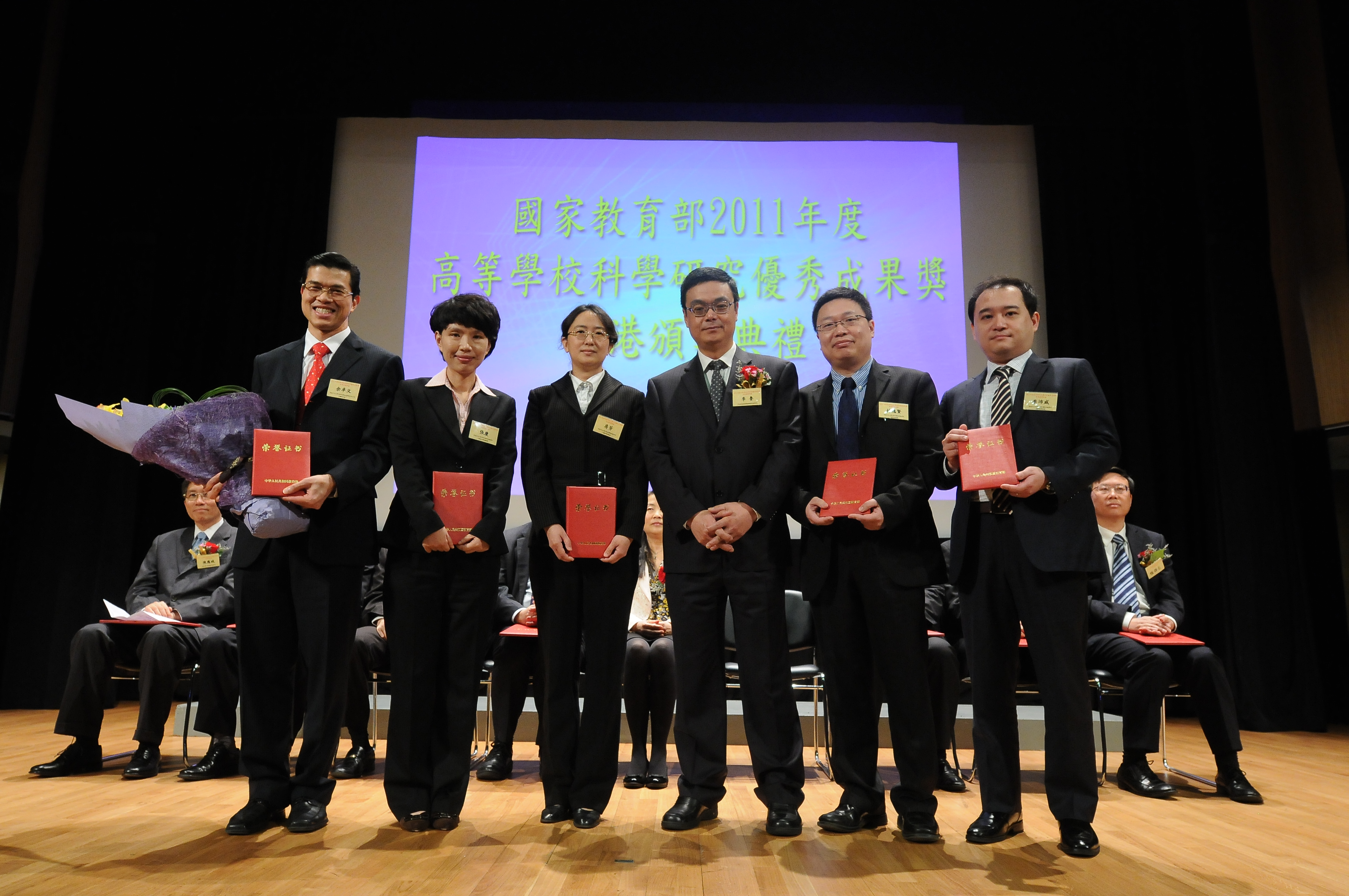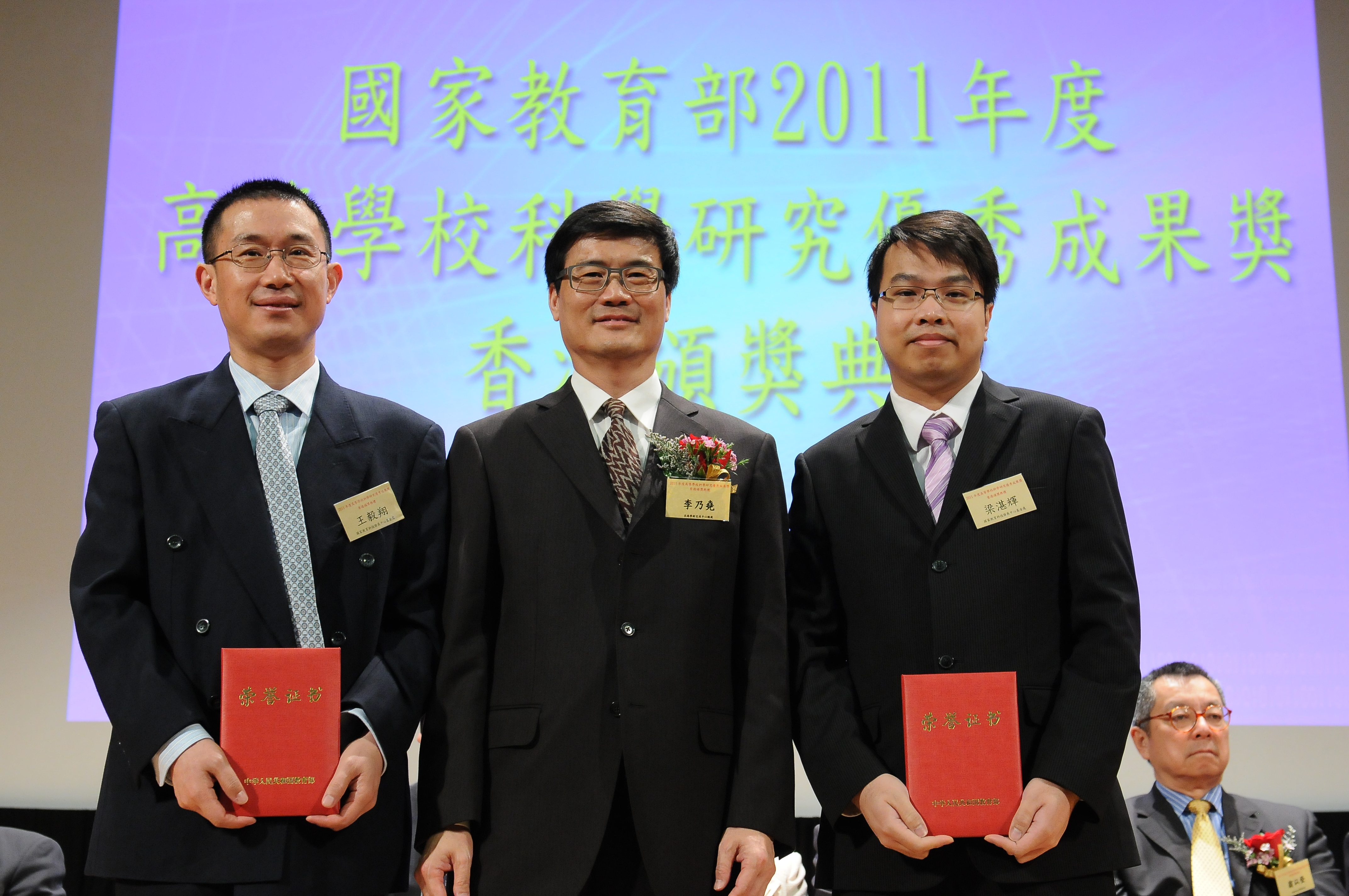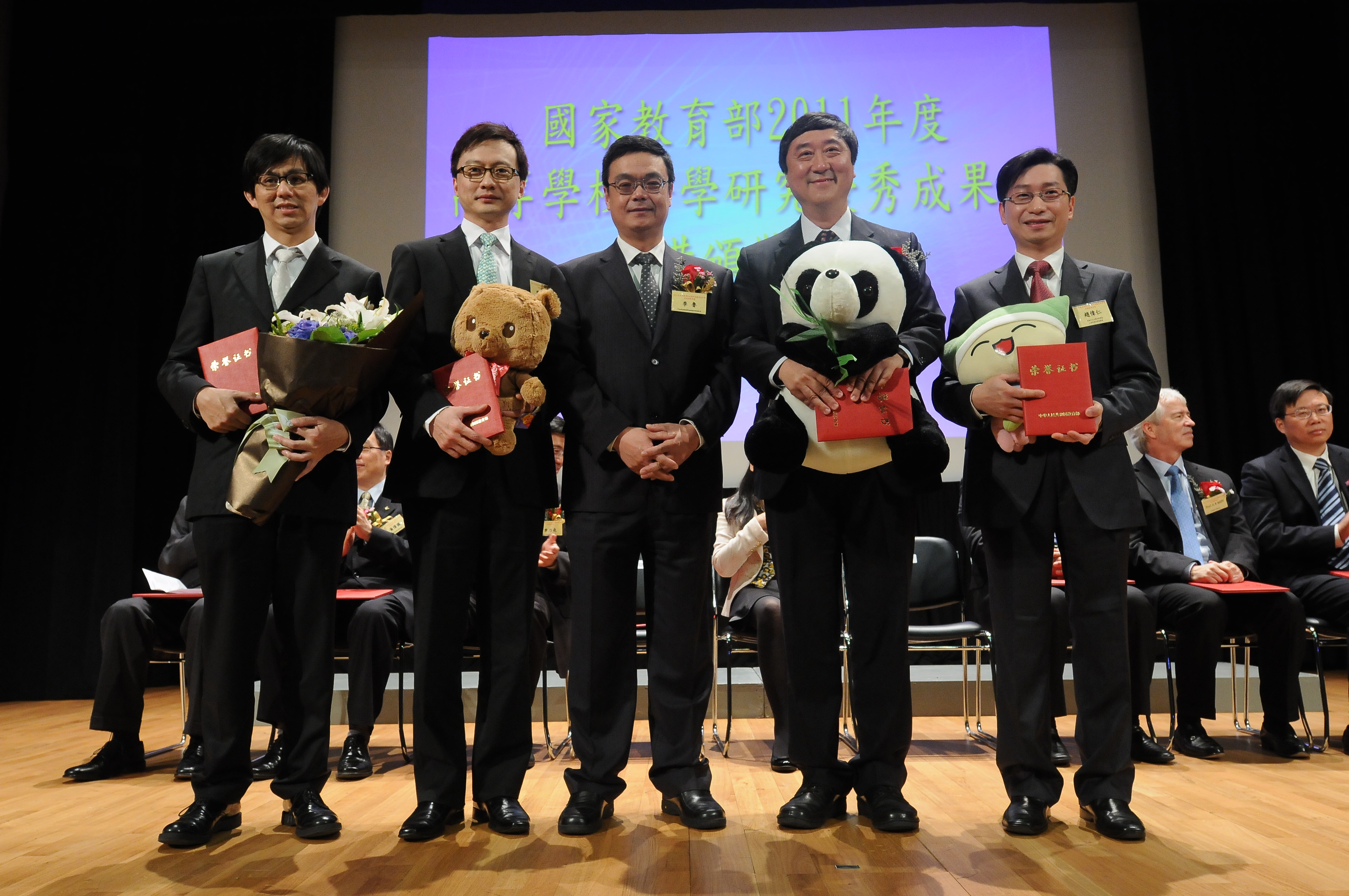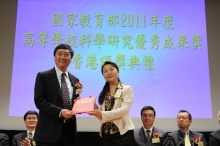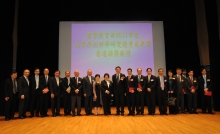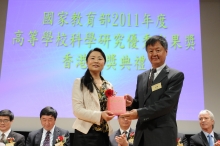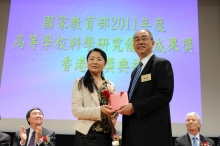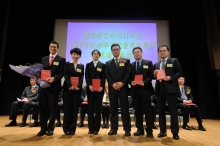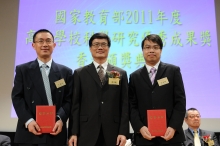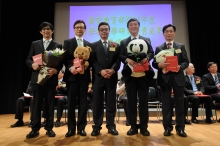CUHK
News Centre
CUHK Received Six Ministry of Education Higher Education Outstanding Scientific Research Output AwardsThe Highest Share among Hong Kong Institutions
The Chinese University of Hong Kong (CUHK) received six Higher Education Outstanding Scientific Research Output Awards (Science and Technology) from the Ministry of Education (MoE) in 2011, including three first-class awards in Natural Sciences, two first-class awards and one second-class award in Scientific and Technological Progress, making it the institution receiving the highest number of awards in the local tertiary sector. The award presentation ceremony was held today (29 March) at the Lecture Theatre of Shaw College, CUHK. Dr. Zhou Jing, Deputy Director-General of the Centre for Science and Technology Development of the MoE, was invited to Hong Kong as the prize presenter.
The award-receiving professors and their projects are:
First-class award in Natural Sciences
- Prof. Wong Ka-sing Lawrence, Mok Hing Yiu Professor of Medicine and Head of Neurology, Department of Medicine and Therapeutics; Prof. Mok Chung-tong Vincent, Professor, Prof. Leung Wai-hong Thomas, Associate Professor, and Dr. Chen Xiangyan, Research Associate, Division of Neurology, Department of Medicine and Therapeutics; and Prof. Yu Chun-ho Simon, Professor, Department of Imaging and Interventional Radiology – ‘Intracranial Large Artery Atherosclerotic Stroke: Epidemiology, Diagnosis, Pathogenesis, Imaging and Treatment’
- Prof. Wang Jun, Professor, Department of Mechanical and Automation Engineering – ‘Neurodynamic Optimization Model Design and Applications’
- Prof. Chan Hon-fu Raymond, Professor, Department of Mathematics – ‘Iterative Solvers for Toeplitz Systems and their Applications’
First-class award in Scientific and Technological Progress
- Prof. Yu Cheuk-man, Chairman, Department of Medicine and Therapeutics, and Head, Division of Cardiology; Dr. Chan Yat-sun Joseph, Associate Consultant, Prof. Lam Yat-yin, Associate Professor, Prof. Lee Pui-wai Alex, Assistant Professor, Dr. Zhang Qing, Adjunct Associate Professor (honorary) and Dr. Fang Fang, Research Assistant Professor, Division of Cardiology, Department of Medicine and Therapeutics – ‘Novel Echocardiographic Applications for Heart Failure – From Prevention to Treatment’
- Prof. Wang Yixiang, Associate Professor, Department of Imaging and Interventional Radiology; Prof. Leung Cham-fai Ken, Adjunct Assistant Professor, Department of Chemistry (in collaboration with Southeast University and Fudan University) – ‘Study and Application of Magnetic Resonance Molecular Imaging and Functional Imaging’
Second-class award in Scientific and Technological Progress
- Prof. Chan Ka-leung Francis, Head, Division of Gastroenterology and Hepatology, Department of Medicine and Therapeutics, and Director, Institute of Digestive Disease; Prof. Lau Yun-wong James, Professor of Surgery and Head, Division of Vascular Surgery, Department of Surgery; Prof. Joseph J.Y. Sung, Vice-Chancellor and Mok Hing Yiu Professor of Medicine; Prof. Chiu Wai-yan Philip, Professor, Division of Upper Gastrointestinal Surgery, Department of Surgery – ‘Innovations and Technological Advancement in Preventing Peptic Ulcer Bleeding’
About the award-receiving projects:
Intracranial Large Artery Atherosclerotic Stroke: Epidemiology, Diagnosis, Pathogenesis, Imaging and Treatment
Stroke is the second leading cause of death in the world. The research team led by Prof. Wong Ka-sing Lawrence confirmed that intracranial large artery disease is the most common cause of stroke in the Chinese population, and for the first time found that artery-to-artery embolism was an important mechanism in stroke patients with large artery disease. Professor Wong’s team performed studies to explore pathogenesis of ischemic stroke, observed postmortem cerebral arteries and compared pathologic findings with clinical MRI results. They also introduced intracranial stenting therapy to Hong Kong with a much lower incidence of intraoperative complications than that of other stroke centres, reaching the world-class standard. Findings of Professor Wong’s original studies have produced over 200 papers in several well-known international medical journals, including a number of SCI papers, which have been cited for over 3,000 times totally.
Neurodynamic Optimization Model Design and Applications
The neurodynamic optimization research aims at building brain-like dynamic models for constructing intelligent systems, contributing to finding optimal solutions for ubiquitous optimization problems in science and engineering. Prof. Wang Jun has made significant contributions in neurodynamic optimization and its applications by developing a complete framework for theoretical analysis and model design which can be applied in scientific computing, data and signal processing, intelligent robots, intelligent control, network flow optimization, and associative memories etc. Over 100 papers about Professor Wang’s research were published in SCI journals and the total number of ISI citations reached over 4,500, well-recognized by many distinguished scholars. Professor Wang was elected IEEE Fellow in 2006, received a 2008-2009 Research Excellence Award from CUHK, a 2009 Natural Science Award (first class) from Shanghai Municipal Government, and the 2011 Outstanding Achievement Award from Asia Pacific Neural Network Assembly.
Iterative Solvers for Toeplitz Systems and their Applications
Toeplitz systems are matrix equations involving Toeplitz matrices. Such systems arise in applications like noise recognition in signal processing, deblurring of pictures in image processing, solution of elliptic partial differential equations, solution of electromagnetic field in integral equations, pricing of financial options in integro-differential equations, and evaluating network loadings in queuing systems. Prof. Chan Hon-fu Raymond has developed superfast iterative solvers for different kinds of Toeplitz systems arising from various applications, overcoming the instability problem and high computational cost in direct solvers, especially for problems in high-dimensional spaces. His techniques and methods have laid down the theoretical foundation and framework for the study of iterative Toeplitz solvers. Prof. Raymond Chan’s research work is highly regarded by his peers and his papers have been cited over 2,000 times (ISI). He has been listed in the ISI Science Citation List of Top 250-Highly Cited Mathematicians in the world since 2004 and, in that particular year, only two mathematicians from mainland China, Hong Kong and Taiwan were on the list. Professor Chan was also the recipient of the Leslie Fox Prize, the Feng Keng Prize of Scientific Computing, and the Morningside Medal of Mathematics.
Novel Echocardiographic Applications for Heart Failure – From Prevention to Treatment
Heart failure has become an important public health issue especially in an ageing society with increasing prevalence of cardiac diseases. Prof. Yu Cheuk-man’s research team demonstrated the superiority of biventricular pacing over conventional right ventricular apical pacing in the prevention of the deterioration of left ventricular systolic function through the first international multicenter clinical trial (PACE) with real-time three-dimensional echocardiography. They established the ‘Yu Index’ that comprehensively elucidated the important role of systolic dyssynchrony in the prevalence, occurrence, progression and prognosis of heart failure. The team also developed a predicting prognosis for patients with heart failure and identified parameters derived from tissue Doppler imaging as new prognosticators. A total of 95 papers have been published in leading peer reviewed journals and cited for over 5,000 times. The results were introduced in various international conferences and a number of innovative findings have been implemented as standard methods in the field.
Study and Application of Magnetic Resonance Molecular Imaging and Functional Imaging
Molecular imaging and functional imaging overcome the limitations of traditional imaging techniques and provide more accurate disease diagnosis and therapeutic response evaluation. The research team led by Prof. Wang Yixiang and Prof. Leung Cham-fai Ken synthesized a number of molecular imaging probes through utilization of new materials and methods. Successful outcomes were achieved in the areas of oncology, cell tracking, cardiovascular and cerebral diseases. The team also combined functional MR imaging with various data processing techniques to systematically study Alzheimer’s disease, depression, Autism Spectrum Disorders (ASD) and their pathogenesis, neuro-imaging and biomarkers to propose methods for early diagnosis and intervention.
Innovations and Technological Advancement in Preventing Peptic Ulcer Bleeding
After a decade of clinical research, the Instituteof Digestive Diseaseat CUHK has revolutionized the management of bleeding peptic ulcers and changed clinical practice worldwide. Innovative treatment solutions include: the use of profound acid suppression with high dose proton pump inhibitors after endoscopic therapy; novel endoscopic treatment for hemostasis of bleeding ulcers as well as trans-arterial embolization to prevent peptic ulcer re-bleeding among high risk patients; and new strategies for preventing re-bleeding among NSAID and aspirin users. These groundbreaking solutions have become new international standards of treatment for bleeding peptic ulcers and the research results were published widely in a number of high impact journals, including New England Journal of Medicine and Lancet, and cited over 1,700 times.
About Higher Education Outstanding Scientific Research Output Awards
The Higher Education Outstanding Scientific Research Output Awards (Science and Technology) is set up by the MoE to recognize outstanding research projects at all tertiary institutions in mainland China. Since 2009, Hong Kong’s tertiary institutions have been included in the scheme. The award is presented to individuals or units who have made remarkable contributions in the areas of scientific discovery, technological innovation, science and technology advancement and implementation of patented technologies. The Natural Sciences Award honours researchers who have made discoveries in natural science and applied science, or given explanations to natural phenomena and characteristics; the Scientific and Technological Progress Award honours research achievements in applied technologies of natural science.
CUHK receives six Higher Education Outstanding Scientific Research Output Awards (Science and Technology) from the Ministry of Education (MoE) in 2011. Prof. Joseph J.Y. Sung, Vice-Chancellor, CUHK, represents the University to receive the award certificate from Dr. Zhou Jing, Deputy Director-General of the Centre for Science and Technology Development of MoE.
Prof. Wong Ka-sing Lawrence (1st left), Mok Hing Yiu Professor of Medicine and Head of Neurology, Department of Medicine and Therapeutics; Prof. Yu Chun-ho Simon (2nd left), Professor, Department of Imaging and Interventional Radiology; Prof. Mok Chung-tong Vincent (2nd right), Professor, and Dr. Chen Xiangyan (1st right), Research Associate, Division of Neurology, Department of Medicine and Therapeutics, CUHK, receive their award certificates from Dr. Zhou Jing (middle).
Prof. Wang Jun, Professor, Department of Mechanical and Automation Engineering, CUHK, receives his award certificate from Dr. Zhou Jing.
Prof. Chan Hon-fu Raymond, Professor, Department of Mathematics, CUHK, receives his award certificate from Dr. Zhou Jing.
Prof. Yu Cheuk-man (1st left), Chairman, Department of Medicine and Therapeutics, and Head, Division of Cardiology; Dr. Zhang Qing (2nd left), Adjunct Associate Professor (honorary), Dr. Fang Fang (3rd left), Research Assistant Professor, Prof. Lam Yat-yin (2nd right), Associate Professor, Prof. Lee Pui-wai Alex (1st right), Assistant Professor, Division of Cardiology, Department of Medicine and Therapeutics, CUHK, receive their award certificates from Mr. Li Lu (3rd right), Deputy Director General of the Education, Science & Technology Department of the Liaison Office of the Central People's Government in HKSAR.
Prof. Wang Yixiang (left), Associate Professor, Department of Imaging and Interventional Radiology; and Prof. Leung Cham-fai Ken (right), Adjunct Assistant Professor, Department of Chemistry, CUHK, receive their award certificates from Mr. Li Naiyiu, President of Beijing-Hong Kong Academic Exchange Center.
Prof. Lau Yun-wong James (1st left), Professor of Surgery and Head, Division of Vascular Surgery, Department of Surgery; Prof. Chan Ka-leung Francis (2nd left), Head, Division of Gastroenterology and Hepatology, Department of Medicine and Therapeutics, and Director, Institute of Digestive Disease; Prof. Joseph J.Y. Sung (2nd right), Vice-Chancellor and Mok Hing Yiu Professor of Medicine; Prof. Chiu Wai-yan Philip (1st right), Professor, Division of Upper Gastrointestinal Surgery, Department of Surgery, receive their award certificates from Mr. Li Lu (middle).


